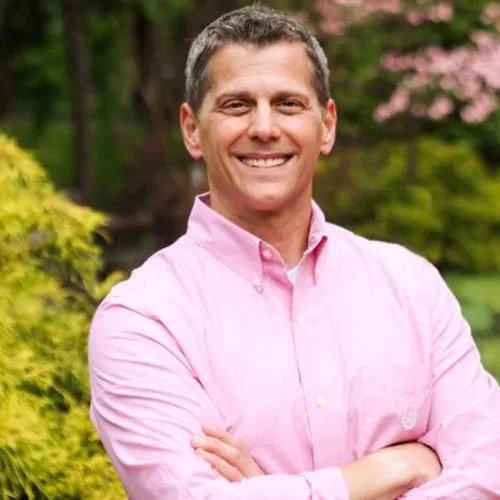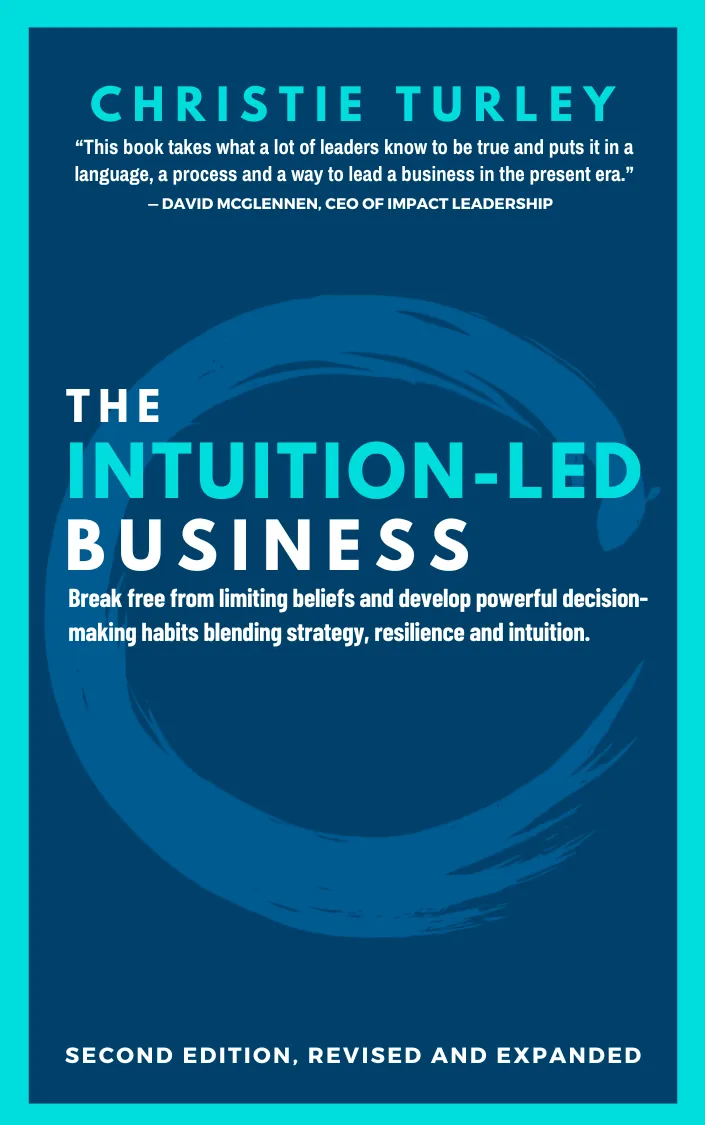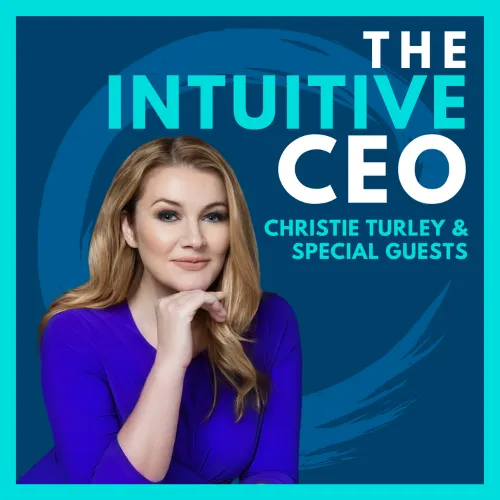
53: The Vantage Point of Failure with Christie Turley
Is the fear of failure or the baggage of past failures keeping you stuck and unable to achieve a new level of success? Join me as I help you bust through limiting beliefs about failure.
In this episode you’ll hear:
How to transform so-called “failure” into innovation.
A personal story about how the universe reflected back the story I was telling about success vs failure.
Examples of inventions and companies to help you reframe your beliefs around failure.
How to shift your perspective of failure to find solutions.
What is actually behind the fear of failure.
Watch on YouTube:
LINKS:
Claim Your Bonuses and Order My Book, The Intuition-Led Business: http://TheIntuitionLedBusiness.com/
Receive help with positioning, messaging and branding your business from with an intuitive approach and from the perspective of your Future self: https://christieturley.com/about
If you’re inspired by this episode, I’d love to hear your biggest Aha! moments. Take a screenshot of you listening on your device and post it to your social media and tag me, @christieturley!
Transcript:
Christie:
What if you had baggage from past failures keeping you stuck? Let’s talk about failure and how to transform it into innovation. Your intuition is your secret weapon in life and business. For many years, I denied that little voice of intuition, leading my business by instinct and intellect which only got me so far. I invested in others’ advise and more knowledge only to find I already had the answers inside of me. By learning to tap my into intuition, I grew my business more quickly than I ever had, with any coach, course or mastermind. Intuition is something we all have and yet, very few of us know how to maximize it—to know things without knowing how you know. Learning how to develop my intuition is the single best investment I have ever made. The world is changing rapidly. To face problems we’ve never seen before, we must lead in ways we never have before. And that means leading with intuition to invent new solutions for the future. I invite you to download a free digital copy of my book, The Intuition-Led Business at IntuitionLedBusiness.com/free. I am Christie Turley, and this is my podcast.
Welcome to The Intuition-Led Business. I’m your host, Christie Turley. And today’s episode is all about the vantage point of Failure. Now Failure is a topic that a lot of people like to avoid because, hey, we like to avoid failure. So let’s avoid talking about it. Well, the funny thing is, that’s exactly what could be holding you back in your success. If you find that you can’t accept failure or you can’t embrace failure, you’ll get more Failure. What we resist, persists.
So let’s talk about how we can reframe failure. What other ways can we look at Failure? What’s another angle of Failure. Well, I had a dream the other night and I’ll tell you about that dream. So this changed my perspective on failure, and that’s what this whole episode is about. I’m gonna be using words like perspective, angle, reframe, Vantage Point—it’s all the same thing! So in this dream, I actually was looking for my car in this huge parking lot. And I decided to climb up this mound of rubble.
It looked like a demolished parking lot. It looked like concrete rebar. Anyway, as I took a step up this weird looking tower of concrete and rebar and my feet were kind of sinking in with every step. It definitely wasn’t a comfortable climb to the top. I finally got on top of this pile and I was looking out and I was looking for this—my car. And I found my car! And it was somewhere in the middle, maybe if you were looking at a 180 degrees, it was right at the 160 or 150 degree mark.
Okay? So I woke up right after this. I didn’t actually see the car. I don’t know what car or the kind of car it was, it doesn’t really matter. But as I was analyzing the dream, I love symbols. I love analyzing dreams. I’ve gotten really good at symbolism. Here’s what I learned. The car represented my purpose or my vehicle to express who I am in this life. And the pile of rubble represented, you guessed it, failure—concrete, rebar and everything. Things I had destroyed. Things I had demolished. Things that I thought were failures. I had to climb up on top of that to get the proper perspective, to be able to see my purpose or the way forward.
Because again, vehicles bring you to places. They take you places. They take you forward, right? Well, you can go backwards too, but that’s not the point. So I’ve been thinking about this dream quite a bit. And as I was waking up, I heard this phrase, “The vantage point of failure.” And I was like, “Wow, that sounds really good!” That’s a cool title. And it was like one of my guides was saying, “Uh huh!” and I’m like, “Oh, you want me to do a podcast episode about this, don’t you?” And I’m like, “Uh huh!” So that’s what we’re doing today. And this, you know—My husband and I have had eight businesses in the past and some of them were great, successes!
Some of ’em would be classified failures. But why were they failures and were they actually failures? Some of them were products of not continuing. Choosing to stop, choosing to not move forward. And that was a deliberate reason—a deliberate choice, rather. And we had our reasons at the time. And would we do it the same way again? Sure! Yeah, we would. You know, others, you know, we thought they would work—they didn’t. Others, we had partners. We thought, you know, was a good match—it wasn’t appropriate for that time and place.
I joked because we’ve had partners that are good, bad and ugly. And it’s so true, you know, but it doesn’t mean you’re a failure. Sometimes it’s something that you just needed to learn. And when you can reframe failures as learning experiences, you’ll propel your growth so much faster. You know, Einstein actually said, or not, not Einstein. I meant Thomas Edison said, “I have not failed. I’ve just found 10,000 ways that won’t work.” And as you know, he was one of the people that came up with the light bulb, Nikola Tesla is also credited with that. And then the whole, if you’ve seen Power Wars, is it talks about this story between Edison and Tesla.
It’s pretty interesting. Well, we’ve gotta shift our perspective to find solutions. And sometimes that means going through failure or I quote, “Learning experience to gain a new perspective.” To find a solution or to find our purpose. And what makes us so afraid of failure? I believe it’s being afraid of the unknown. And this is a huge thing. It’s also why I wrote my book. One of the reasons why I wrote my book, The Intuition Led Business, the subhead of that book is ‘Navigating Business Through Uncharted Waters.’ And that’s what we’re faced with. In the years that come, we’re going to have more change than we’ve ever experienced in our lives.
And it’s going to come faster than we’ve ever experienced it. Some people have said that there is going to be more progress than the next 10 years than there has been in the last 50. And that is exciting but for some people it’s also terrifying. Because as humans, so we tend to not like change. Yet we know the only constant thing in life is change. So how do we get over our fear of the unknown? You know? And how do we know it’s failure? You know, when we look at a storybook or a movie, those endings always happen happily—it seems.
It always seems like everything turns out. Well, if you are finishing your story, your personal story about a certain situation. At the moment of failure, you haven’t probably gone long enough. Because after every dark night of the soul, after every challenge, after every brush with death or being faced with a dragon, there always comes a time where everything is put right in it’s place. And you realize that that big challenge was actually a part of your divine plan. It was actually part of your purpose. And those lessons learned help you to be who you are today.
Yes, we’ve had 8 businesses. Yes, not all of them have been great. Yes, we went through seven years of infertility—Talk about failing at starting a family! Did that make us wanna stop? Sometimes, yes. But think about children. You know, as they’re learning to walk, think about the faith that they have to keep trying. Their brains don’t register success and failure, really. Not like how we’ve learned it. They say, “Oh! Okay, well that wasn’t the way to do it. I’m gonna try it this other way.” And they keep trying. And how do we know this? Because we’re all walking up on two feet.
Some of us don’t have that, or whatever. And I understand that. I’ve met a lot of people that do not walk, but the majority of us do walk on our two feet. We are not crawling around, right? On our all fours. Think about the faith. They know they’re going to walk one day. Same thing with farmers. It doesn’t matter how many crops have failed in the past. They plant seeds. Why do they plant seeds? Not because they’re expecting it to fail but because they’re expecting something to grow. Think about that faith. So, yes, we don’t know the future. It is unknown. One way to overcome that fear of the unknown is to do something that completely terrifies you.
For some people that’s going to be doing a parachute jump. And for some, it’s going to be going live on Facebook. Challenge yourself today to think of something that absolutely terrifies you and then go and do that. And once you overcome that particular challenge that you’ve created for yourself, you’re going to find that other causes of uncertainty are a breeze that you can overcome. Overcome that uncertainty in an easier way.
The universe is always going to reflect back to you the story that you tell. So if you tell yourself that you are going to fail or oh, if you’re afraid of being wrong, the universe will reflect that back to you. In neuroscience, studies actually have found this to be true that when someone is afraid of making a wrong choice or saying the wrong answer, that actually shuts down the part of your brain that’s all about learning. So think about that.
And I have a story in my book, The Intuition Led Business, that I talk about—about how one day we were faced with this humongous tax bill. Humongous tax bill! And we knew we did well in that year, but I mean, this was shocking! And we didn’t know how we were gonna pay it. We just knew we would pay it! And we would be able to find a way to do it. And I let it go. I prayed about it and asked for help and all that. And I let it go. Like, you know what? There’s gonna be a solution that shows up. I just know it! And one day, we had a call from a potential client who needed help right away.
And they could make a decision quickly. They had the money to invest and we gave him a proposal. And they said, it sounded great. And it happened to be more than enough to cover the tax bill. And that was amazing! Well, the story doesn’t end there, of course. The story only ends when you decide it’s ended, right? So fast forward a couple more years, and this same client was faced with this situation. We actually were summoned. We got sued because they had filed bankruptcy and we had received money within 90 days of them filing that bankruptcy.
Well, according to the law in that state, that money was now owed back to the executor of the bankruptcy to be distributed accordingly to how they saw it. And as I looked at the loss—and my husband and I were looking at it, and we were listed. We’re the small business also listed with big businesses like American Express and a lot of other big, big, big companies! And this was not cool. Now we owed all of that money again; plus some, because this particular project also has some postal expenses where we paid printer to print and to mail.
And so we were paying postage, we were paying printing costs that we were just basically passing through our company. So we received the money. We paid the money out and we kept some of the money, if that makes sense. So we were being asked for all the money—even the money that was paid for postage and printing. So we were like, “Great! Wow!” This is even more shocking than the tax bill. And what are we gonna do? Well, same kind of same kind of reaction. “We’ll find a way.” We know we have that faith. We didn’t know how it was going to happen. We just knew it was gonna happen. And we’re gonna be able to pay it. And so, one day, we were at this conference that felt like we were supposed to be there.
A friend had invited us there. Definitely helped us with our business. And we were there in the last day and one of our other friends walked through the door. He hadn’t gone to the event, but he had been invited by someone else. And we saw him and we were like, “Hey, what’s up?” This was an old business coach of ours. And we hadn’t seen him in a few years. And he proceeded to tell us that he had a difficult experience and that he had had to file bankruptcy. It was an over a million dollar bankruptcy, personal bankruptcy, corporate bankruptcy, everything like this. And we were like, “Oh no!” It was during the realest state, a bubble bursting.
And it was all very understandable and there was no judgment at all. And actually we felt honored that he could confide in us this way. And we said, “You know, that’s interesting because this other thing happened to us where we we’re now owing this trustee this money and being wrapped up in this lawsuit from this bankruptcy—this other client of ours. Do you think this attorney that helped you could help us with that?” And he was like, “Oh, yeah!” And so he made an introduction. We went to meet with the attorney. The attorney said that he could get this figured out, that he could get it dismissed, that we wouldn’t have to pay it.
We would only have to pay him two grand for a phone call because he knew the trustee personally. And we’re like, “30 minute phone call, two grand?! Compared to the big amount that we owed? Okay! Done. That’s a great deal!” And then he said, “You know what? I need a new website. What can you do for me?” And we put together a proposal and we actually ended up making money on the deal because the website cost a little more than what we paid him for his services. So, you know, it’s interesting because the universe will reflect back to you the story you tell. It never once entered our consciousness that we would fail or that we would not be able to pay it.
Like we just do (knew), we would be able to pay it. So let’s reframe failure in another way. So as you know, every single inventor that has ever lived and has ever invented something that you know about, that they’re probably a household name, even if they’re not—the invention is probably something that you use on an almost daily basis, if not once in a while. You’ve heard of it, You’ve seen it. Any great invention, right? Well, inventors face failure all the time. That’s why I opened up with Edison’s quote, “I have not failed. I’ve just found 10,000 ways that won’t work.”
So would you rather—let’s ask you a question. I’m gonna give you a multiple choice. You have two choices. Would you rather fail at innovation nine times? And on the 10th attempt, you were so successful and the ripple effect is immeasurable—like your life, your business, your customers’ lives, all transformed completely? Or option B. Would you rather play it safe and make a respectable income and impact, but know that you didn’t come close to fulfilling your life’s mission and purpose? Which one?
So innovation is now your new competitive advantage. Innovation is the sister to failure. That’s your new competitive advantage, especially when we’re going through so much change. Innovation is going to have to be your new favorite word. I’ll give you some examples of some fun things throughout history. So, the bicycle. So throughout the 1800s, the bicycle was constantly tweaked until it gained popularity. And it started out as a man’s athletic sport, and then it became accessible to women, children, and non-athletes because the safety bicycle came along.
And it answered a lot of the challenges that women, children and non-athletes were having. And it was an answer to safety and speed and comfort and steering. So that is one way, I mean, do we call an 1800s bicycle a failure? No. Could it have been so much more? Yes, and it did! Because they weren’t afraid to innovate, weren’t afraid to fail. Another example is Play Doh. It was actually originally a goo to remove soot off of wallpaper.
And once gas and electric heating came along, it looked like the product was no longer needed. And when the inventor’s sister-in-law, who was the teacher, told him to add some color to it and offer it to kids. And that is when Play-Doh began. And then there’s Instagram, something a little more modern. So it started as an app called Burbn. B-U-R-B-N. And it was a mobile app that allowed users to check in at a particular location, earn points for hanging out with their friends and post pictures of the meetups.
But they found out that users only wanted to share their photos. So they simplified it and Instagram was born. So it’s those little tweaks, those outside the box ideas. Those simple but innovative changes that can transform your entire business. And I love finding those little hinges that swing big doors. Those unnoticed nuggets of gold that are invisible to you because you don’t see them, but you’re sitting on them. You have piles of hidden gold underneath you, and you do not even know it.
And the perspective that you have gained because of the failures, because of the learning experiences. Do me a favor, think about everything from your past. I want you to do a little journaling exercise, actually. Write down things from the past that you consider failures. And after you do that, I would love for you to write down what you learned from those experiences. And then I would like you to write down how you think those experiences has affected you now in a positive way. I know you could probably think of negative things, but think of how those experiences have contributed to the person that you are, your character.
Or new ideas that have come. Or being able to help someone with a similar problem, because you had been through the same thing. Or whatever it is, write those down. And then what I want you to do is, I want you to release any kind of limiting belief of around failure. Let go a failure. Let go of that. That is even a bad thing! Failure is not a bad thing. Is learning a bad thing? No. Failure isn’t either. And then what I want you to do, is I want you to envision. Like in that dream that I had at the beginning that I mentioned.
I want you to imagine that you’re climbing on top of this pile of so-called failure. And now you’re perspective is so much higher. Your perspective—you can see more clearly. You can see things that you wouldn’t have been able to see before. And that can lead you to your purpose. That can lead you to your most fulfilling life and business. And I leave that with you here. That from this day forward, you will look at failure as your vantage point and your competitive advantage and turn that failure, transform that failure into innovation.


















